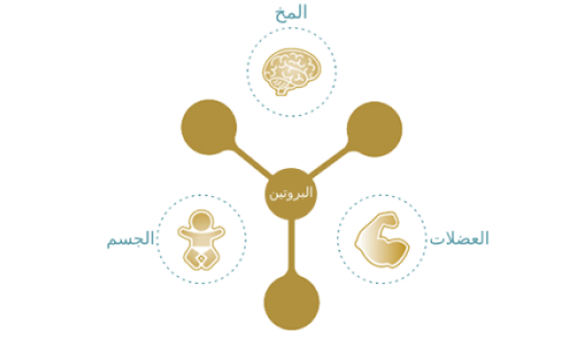
Importance of Optimized Protein
Growth and development are fastest during early childhood. During this time, children develop motricity and communication skills, their initial body and brain size often triple, or more. Children need appropriate nutrition to fuel their daily needs, but also to readily build strong foundations for lifelong health. Protein quality and amount are core factors.
Protein is the foundation of your child’s body and health

"Protein intake is essential for your child’s growth and development and contributes to building the entire body including the brain and muscles. Protein is made up of individual components called amino acids 1,2, some of which cannot be produced by our bodies and must come from our food2.
Adequate amount of high-quality protein fosters body development, including that of the digestive and immune systems, and also leads to healthy weight gain, contributing to build a strong foundation for your child’s development."
Why is it essential to optimize protein in milk formula?
Breast milk sets the standard for infant nutrition because it has:
- the right protein quality, in terms of amino acid variety and amount,
- and the right protein amount for your baby’s healthy growth and development3.
Sometimes, however, breastfeeding is not possible or needs to be supplemented by formula. In such cases, a scientifically designed milk formula can help parents meet their child’s needs.
Furthermore, getting as close as possible to human milk requires cutting edge technology.
Why is it so challenging? Because protein quality and amount in cow’s milk, the base ingredient of infant formulas, are radically different from that of human milk."

Protein quality
Unlike cow’s milk, which is mostly composed of casein (80% casein - 20% whey4), human milk is mostly composed of whey, with whey to casein ratios varying significantly over the course of lactation: nearly 90% whey - 10% casein in colostrum, to 65% whey - 35% casein by week two5.

In addition, cow’s milk contains a very unique protein called caseino-glycomacropeptide (CGMP), which is rich in certain amino acids, especially Threonine, and which may lead to accelerated weight gain in early infancy 6, a risk factor for subsequent higher obesity rates7.
Protein amount

The amount of protein in human milk and cow’s milk is very different. Mature human milk (after 30 days) generally contains a much lower concentration of protein (1.3g/100ml compared with 3.0 to 3.5g/100ml for cow’s milk). As a result, when breastfeeding is not possible, parents look for a formula with the right quality and amount of protein – a formula with optimized proteins.
Optimized protein: cutting edge technology produces amazing results
An optimized protein, generally a cow’s protein, is one whose profile has been optimized to resemble human milk protein. Predominantly based on whey protein, it fosters smooth digestion3,8,9,10.
Optimizing protein quality
Currently, the most innovative process allows to selectively remove the CGMP protein from the whey, thus decreasing Threonine levels by 25%.

Optimizing protein amount
Once whey has been optimized, it is combined with cow’s milk to lower protein content to 1.8g/100 kcal, an amount within the range of mature human milk’s protein content. Protein amount is very important: your child needs the appropriate amount11,12,13,14 at a given stage of his or her life.
As a result, amino acid profiles are as close as possible to that of breastmilk. The obtained age-appropriate formula may contain a combination of optimized proteins and other ingredients, such as HMO and probiotics for additional benefits.
With optimized protein, you can support your child’s healthy development when breastfeeding is not possible and help provide a strong foundation for their future health.
IMPORTANT NOTICE. Exclusive breastfeeding is recommended during the first 6 months of life followed by the introduction of adequate nutritious complementary foods, along with sustained breastfeeding up to two years of age and beyond.

References:
- Food and Agriculture Organization of the United States. Human nutrition in the developing world. Available from: http://www.fao.org/docrep/w0073e/w0073e04.htm. Accessed: January 2015.
- MedlinePlus, National Institutes of Health. Amino acids. Available from: http://nlm.nih.gov/medlineplus/ency/article/002222.htm. Accessed: January 2015.
- Lönnerdal B. Nutritional and physiologic significance of human milk proteins. Am J Clin Nutr, 2003. 77(6):1537S-1543S.
- Wal JM. Cow’s milk proteins/allergens. Ann Allergy Asthma Clin Immunol. 2002;89(Suppl 9):3-10.
- Lönnerdal B, Erdmann P, Thakkar SK, et al. Longitudinal evolution of true protein, amino acids and bioactive proteins in breast milk: a developmental perspective. J Nutr Biochem. 2017;41:1-11.
- Koletzko B, von Kries R, Monasterola RC, et al. For the European Childhood Obesity Trial Study Group. Can infant feeding choices modulate later obesity risk? Am J Clin Nutr. 2009;89(suppl):1S-7S.
- Haschke F, Ziegler EE, Grathwohl D. Fast Growth of Infants of Overweight Mothers: Can It Be Slowed Down? Ann Nutr Metab. 2014;64(suppl 1):19-24.
- European patent, 1997.
- Raiha NC, Fazzolari-Nesci A, Cajozzo C, et al. Whey predominant, whey modified infant formula with protein/energy ratio of 1.8g/100kcal: adequate and safe for term infants from birth to four months. J Pediatr Gastroenterol Nutr, 2002. 35(3):275-281.
- Billeaud C, Guillet J, Sandler B. Gastric emptying in infants with or without gastro-oesphageal reflux according to type of milk. Eur J Clin Nutr. 1990;44: 577-583.
- Michaelson KF, Greer FR. Protein needs early in life and long-term health. Am J Clin Nutr, 2014. 99(suppl):718S-722S.
- Escribano J, Luque V, Ferre N, et al. Effect of protein intake and weight gain velocity on body fat mass at 6 months of age: the EU Childhood Obesity Programme. Int J Obes, 2012. 36:548-553.
- Koletzko B, von Kries R, Closa R, et al. Lower protein in infant formula is associated with lower weight up to age 2 y: a randomized clinical trial. Am J Clin Nutr, 2009. 89:1836-1845.
- Weber M, Grote V, Closa-Monasterolo R, et al. Lower protein content in infant formula reduces BMI and obesity risk at school age: follow-up of a randomized trial. Am J Clin Nutr,2014. 99(5):1041-1051




















